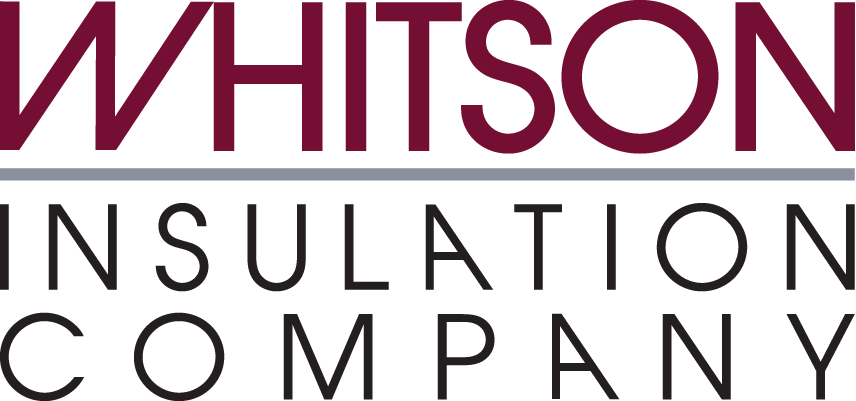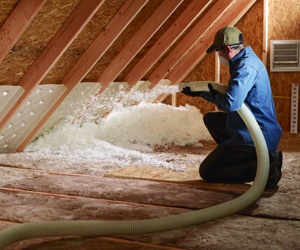Keeping your Michigan home warm in winter and cool in summer isn’t cheap. In fact, nearly half of your home’s energy use goes into heating or cooling. But there’s good news, making two important upgrades can lower your energy bills, improve your home’s indoor air quality, and make your home more comfortable all year long.
Why These Upgrades Matter
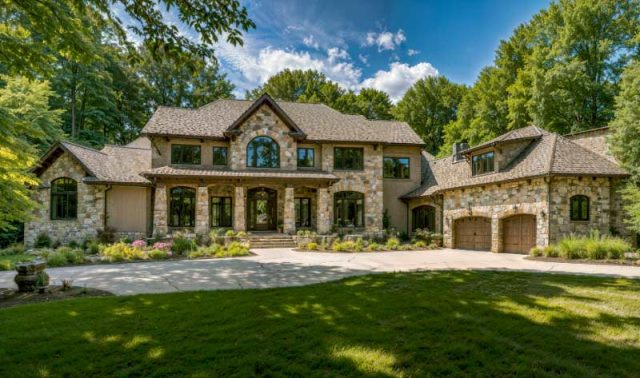 Our weather, from long and cold winters to warm summers, puts serious energy strains on your home. Without proper insulation or efficient heating equipment, your home leaks air, especially through the attic. Did you know that up to one-third of your home’s heat can escape through your under-insulated attic in the winter while that same attic can let in up to 60% of unwanted heat during summer?
Our weather, from long and cold winters to warm summers, puts serious energy strains on your home. Without proper insulation or efficient heating equipment, your home leaks air, especially through the attic. Did you know that up to one-third of your home’s heat can escape through your under-insulated attic in the winter while that same attic can let in up to 60% of unwanted heat during summer?
In the Great Lakes region, homeowners must deal with frigid temperatures and significant snowfall. Having a poorly insulated home in these conditions can cause cold drafts and ice dams on your roof.
Because your home is one contained unit, each system directly impacts another system. You’ll save more and stay more comfortable by taking a whole-home approach. That means focusing on both your home’s insulation and HVAC upgrades.
Upgrade #1: Improve Insulation and Air Sealing
Insulation and air sealing play a crucial role in holding in warm or cool air. Your attic is the top priority, but other key areas to target include your exterior walls, floors over unheated areas, the basement, and the crawlspace (if you have one).
Start with sealing air leaks. These tiny penetrations around your windows, doors, ductwork, and more add up quickly. Altogether, air leaks can equal leaving a window open all year! Be sure to seal these leaks with caulk, weatherstripping, or spray foam for maximum results. Once the leaks are sealed, add proper insulation. Start with your attic. For Michigan homes, aim for R-49 to R-60 of insulation in your attic for optimum efficiency. Together, air sealing and insulation can lower your energy costs by around 15%, which means if you spend $2,000 per year on utilities, you would save around $300 every year.
You’ll also enjoy added comfort, including:
- Fewer drafts and cold spots.
- More stable indoor temperatures.
- A quieter, healthier home with less dust and pollen.
- Less risk of roof damage from ice dams.
Upgrade #2: Modernize Your HVAC System
If your furnace is 15-20 years old or your central AC struggles to keep up, it may be time for an upgrade. Older systems often run inefficiently, adding strain on your HVAC system or furnace and driving up costs. Replacing your outdated system with a high efficiency ENERGY STAR model can reduce your energy bills by nearly $140, says the Environmental Protection Agency (EPA).
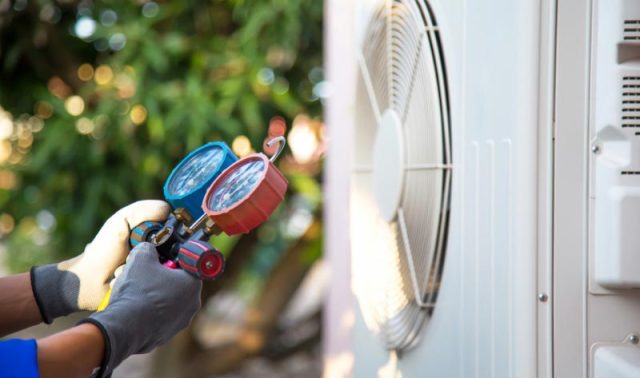 Updated heating or cooling options for your Michigan home include:
Updated heating or cooling options for your Michigan home include:
- High-efficiency natural gas furnaces (95% AFUE model or better).
- Cold-climate heat pumps that heat and cool living spaces in one system.
- Variable speed blowers as a feature to consider that use less electricity.
- New central AC units with higher SEER ratings (Seasonal Energy Efficiency Ratio)
Don’t forget smart controls and maintenance. Installing and using a programmable thermostat wisely can save you approximately $100 per year. Duct sealing can improve your HVAC system’s overall efficiency by up to 20% while routine maintenance can keep your system running at its peak ability.
Ultimately, key benefits of HVAC upgrades include:
- Lower energy bills for more money back in your wallet.
- Better comfort and airflow with more even temperatures and quieter operation.
- Smart controls that add extra savings on top of equipment efficiency gains.
- Reliability and safety that give you peace of mind during extreme weather.
Energy Savings Comparison: Insulation vs HVAC Upgrades
Ultimately, combining both upgrades yields the best results. Proper insulation reduces the load on your HVAC system, while an efficient HVAC unit runs less often to maintain a more comfortable home. Here’s a quick comparison of potential energy savings:
Sealing and insulating your home
Potentially earn an average 15% reduction in your heating and cooling costs, around $200-$300 per year.
Upgrading your HVAC system
See approximately a 10-20% reduction in your heating and cooling energy use. Replacing your old equipment can save $140 or more a year, while using a smart thermostat adds about 10% in savings.
Federal and Local Incentives
Check out available federal incentives that help you pay less for energy upgrades:
Federal Tax Credits
- The Energy Efficient Home Improvement Tax Credit (Section 25C) credits back up to 30% of the cost of certain energy upgrades between 2023-2032.
- Receive up to $1,200 a year back for insulation or window upgrades.
- Receive up to $2,000 in tax credit for installing a heat pump.
- Credit renews each year.
Talk to your local professional insulation company about other possible local or federal incentives you may qualify for.
Michigan Homeowner Tips for Maximizing Energy Savings
- Start with the attic.
- Seal before insulating so you don’t hide air leaks. Spray foam, caulk and weatherstripping are ideal for the job.
- Get a home energy audit to pinpoint energy loss and receive educated solutions. Many utilities offer discounted or free audits.
- Set your programmable thermostat back 7–10°F overnight or while away in the winter and keep it warmer in the summer.
- Check with your local utilities for instant rebates or free smart thermostats.
- Take advantage of freebies such as LED light bulbs, high-efficiency showerheads, or even pipe insulation through home energy analysis programs.
- Think of your home as a system and plan upgrades in phases for the best return- energy audit and insulation this year, HVAC system next year, windows later, etc.
- Stay informed of energy programs. Check utility websites and Michigan.gov/energy often for updates.
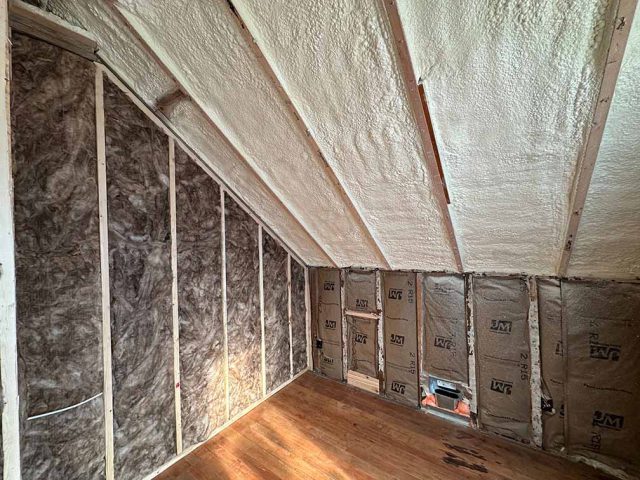
Ready to Save?
Controlling how air enters and exits your home, and conditioning it efficiently, is key to improving your home’s energy efficiency. Tackle both insulation and your HVAC system and you’ll feel the difference on the coldest January nights and hottest July afternoons.
Our experienced team at Whitson Insulation Company has been improving the energy efficiency of our Grand Rapids community and beyond since 1978. We specialize in insulation solutions for both homes and businesses and are here to help you save money and energy. Contact us today to schedule a free insulation estimate.
____________________________________________________________________________________
References
Consumers Energy. (n.d.). Home energy analysis. https://www.consumersenergy.com/residential/savings-and-clean-energy/assessments/home-energy-analysis#:~:text=Schedule%20a%20free%20home%20energy,water%20pipe%20insulation%20and%20more
Consumers Energy. (n.d.). Home solutions program. https://www.consumersenergy.com/residential/savings-and-clean-energy/home-solutions-program#:~:text=Earn%20up%20to%20%24500%20in,up
Consumers Energy. (n.d.). Windows and insulation rebates. https://www.consumersenergy.com/residential/save-money-and-energy/rebates/windows-and-insulation#:~:text=Earn%20%2415%20for%20each%20qualifying,to%20%24450%20for%20qualifying
DTE Energy. (n.d.). Wi-Fi enabled thermostats. https://www.dteenergy.com/us/en/residential/save-money-energy/rebates-and-offers/wi-fi-enabled-thermostats.html#:~:text=DTE%20electric%20and%20natural%20gas,eligible%20for%20a%20%2450%20rebate
ENERGY STAR. (n.d.). Heating and cooling. https://www.energystar.gov/saveathome/heating-cooling
ENERGY STAR. (n.d.). Heating and cooling equipment. https://www.energystar.gov/saveathome/heating-cooling#:~:text=If%20your%20HVAC%20equipment%20is,rather%20than%20your%20HVAC%20equipment
ENERGY STAR. (n.d.). Insulation R-values. https://www.energystar.gov/saveathome/seal_insulate/identify-problems-you-want-fix/diy-checks-inspections/insulation-r-values#:~:text=6%2C%205%2C%20and%204C
ENERGY STAR. (n.d.). Smart thermostats. https://www.energystar.gov/saveathome/heating-cooling#:~:text=Install%20a%20smart%C2%A0thermostat
ENERGY STAR. (n.d.). Why seal and insulate. https://www.energystar.gov/saveathome/seal_insulate/why-seal-and-insulate
Michigan Department of Environment, Great Lakes, and Energy. (n.d.). Home energy rebate programs. https://www.michigan.gov/egle/about/organization/materials-management/energy/rfps-loans/home-energy-rebate-programs/communities
Michigan League of Conservation Voters. (n.d.). Save money with home energy efficiency tax credits. https://www.michiganlcv.org/save-money-with-home-energy-efficiency-tax-credits/#:~:text=Save%20money%20with%20home%20energy,cap%20for%20heat%20pumps
Michigan State University Extension. (n.d.). Improving home insulation for savings and comfort part 4. https://www.canr.msu.edu/news/improving_home_insulation_for_savings_and_comfort_part_4
Planet Detroit. (2024, January). Energy efficiency in Michigan: What you need to know. https://planetdetroit.org/2024/01/energy-efficiency-in-michigan-what-you-need-to-know/
Trane. (n.d.). Updating your HVAC could save you 20 percent or more. https://www.trane.com/residential/en/resources/blog/updating-your-hvac-could-save-you-20-percent-or-more/#:~:text=Updating%20Your%20HVAC%20Could%20Save,That%27s%20a
